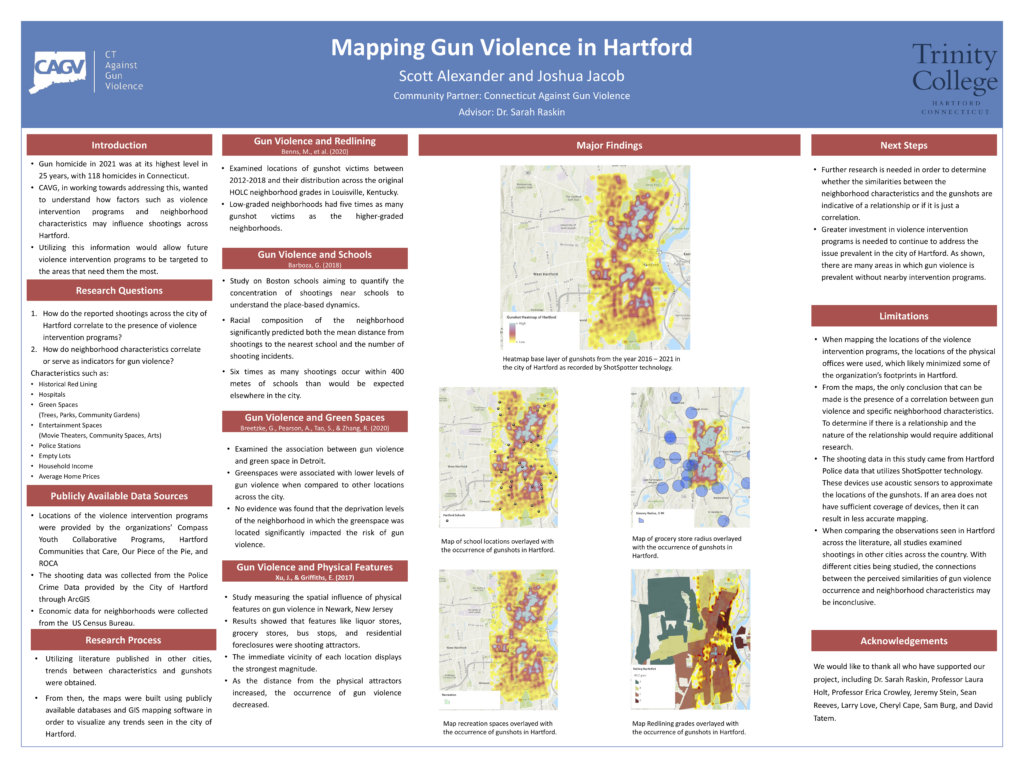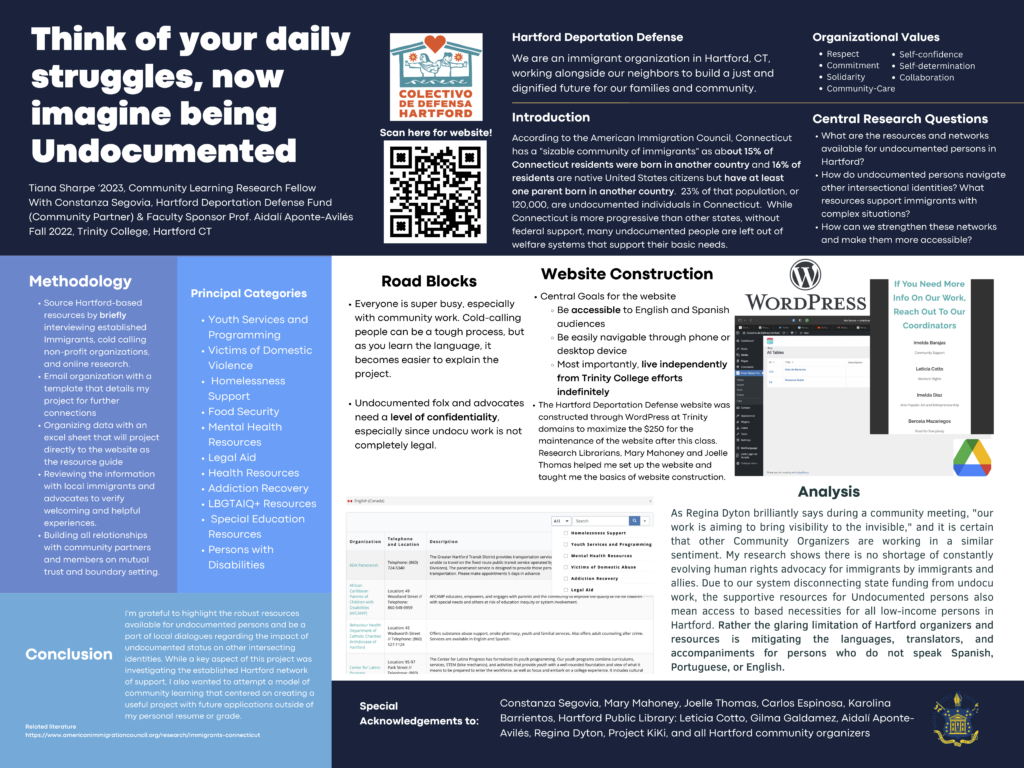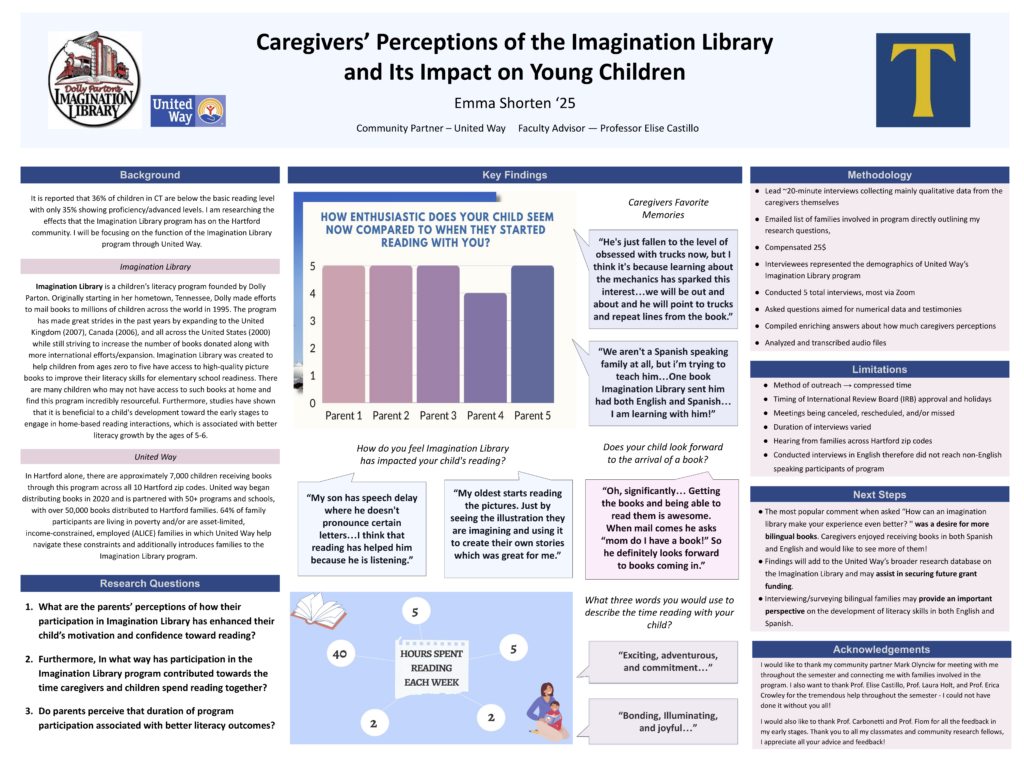Community Learning Research Fellows Present Projects with Hartford Partners
The Center for Hartford Engagement & Research is pleased to share final research posters from the Fall 2022 Community Learning Research Fellows! This selective program allows students with previous community engagement experience to challenge their learning by taking on research or creative projects grounded in the value of mutual benefit: students deepen their learning and their project advances the goals of Hartford community partners.
With guidance from Colloquium Instructor Laura Holt, Teaching Assistant Sam Burg ’24, Director of Community Learning Erica Crowley, peers, and community partners, fellows develop an appreciation for community-based research, hone their research, discussion and presentation skills, and learn from one another’s successes and challenges. To further support and structure the projects for success, the program incorporates a shared expectations document that community partners, fellows and faculty advisors contribute to at the start of the semester and fellows submit regular progress memos that are viewable by their instructor, faculty advisor, community partner, and peers.
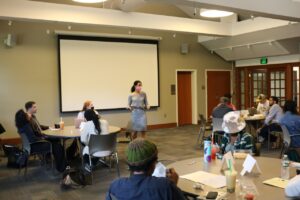
Throughout the fall 2022 semester fellows attended weekly seminars covering a series of topics related to community-based research: identifying a question and designing a research project, communicating a research plan, developing good interviewing skills, analyzing and visualizing data, designing research posters and other products, and addressing challenges in collaborative projects. They were further supported through regular large group colloquium sessions where faculty advisors, peers, and key staff from across campus provided feedback on projects in advance of the final poster conference.
We congratulate the fellows, faculty sponsors and community partners for their work together this semester and we extend a special thank you to our guest evaluators Fionnuala Darby-Hudgens IDP ’13 and Kae Taylor IDP ’15, Teaching Assistant Sam Burg ’24, and Dave Tatem, Cheryl Cape, Ilda Ramos, John Dlugosz, Trinity’s Institutional Review Board, and the entire Center for Hartford Engagement & Research (CHER) team. None of this work would be possible without the support and contributions by many across the Trinity and Hartford community.
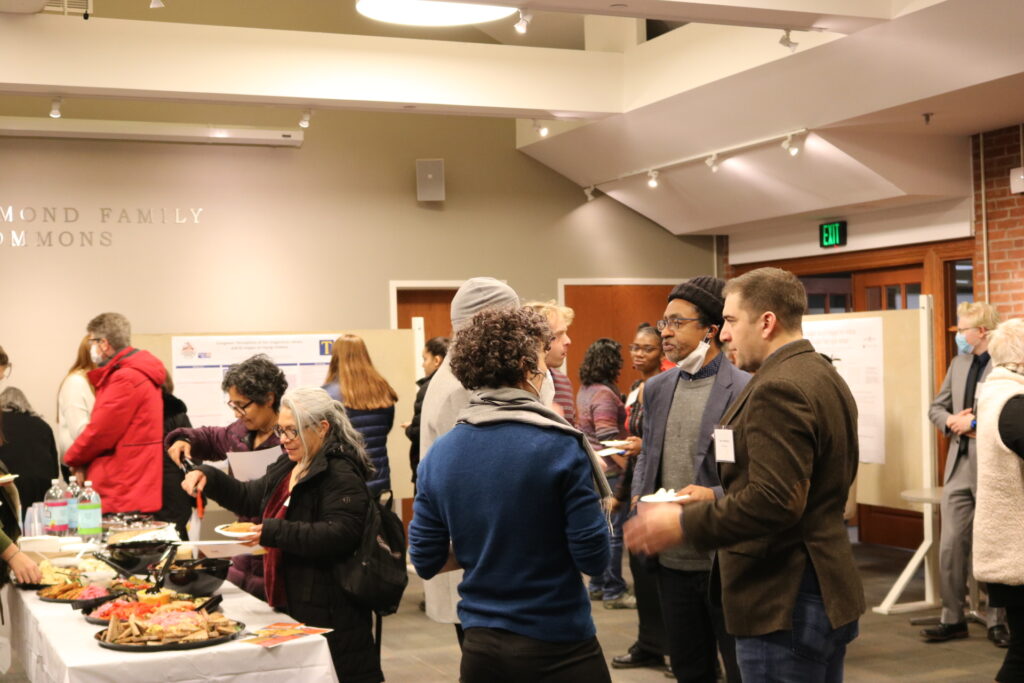
Challenges Faced by Women of Color Following Incarceration
Anna Grant-Bolton ’25, Olivia Papp ’23, Reese San Diego ’25 and faculty sponsor Ben Carbonetti with community partner Her Time Hartford
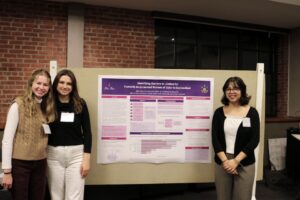
Abstract: Identifying specific challenges faced by women of color transitioning out of the prison system in Connecticut is critical to developing comprehensive support services following incarceration. However, there is little research on how race, gender, and past incarceration intersect to form unique barriers to justice for formerly incarcerated women of color. Disseminating a digital survey to formerly incarcerated women of color affiliated with the Connecticut nonprofit, Her Time, we collected primarily quantitative data to assess which social services were and were not received and identify the role of Her Time in supporting clients following incarceration. We found that transportation, housing, and employment support were the most frequently requested services following incarceration for respondents, that Her Time was most effective in providing participants with community support, PTSD resources, and education services. These findings have implications for Her Time, the Connecticut re-entry system, and formerly incarcerated Black and Brown women.
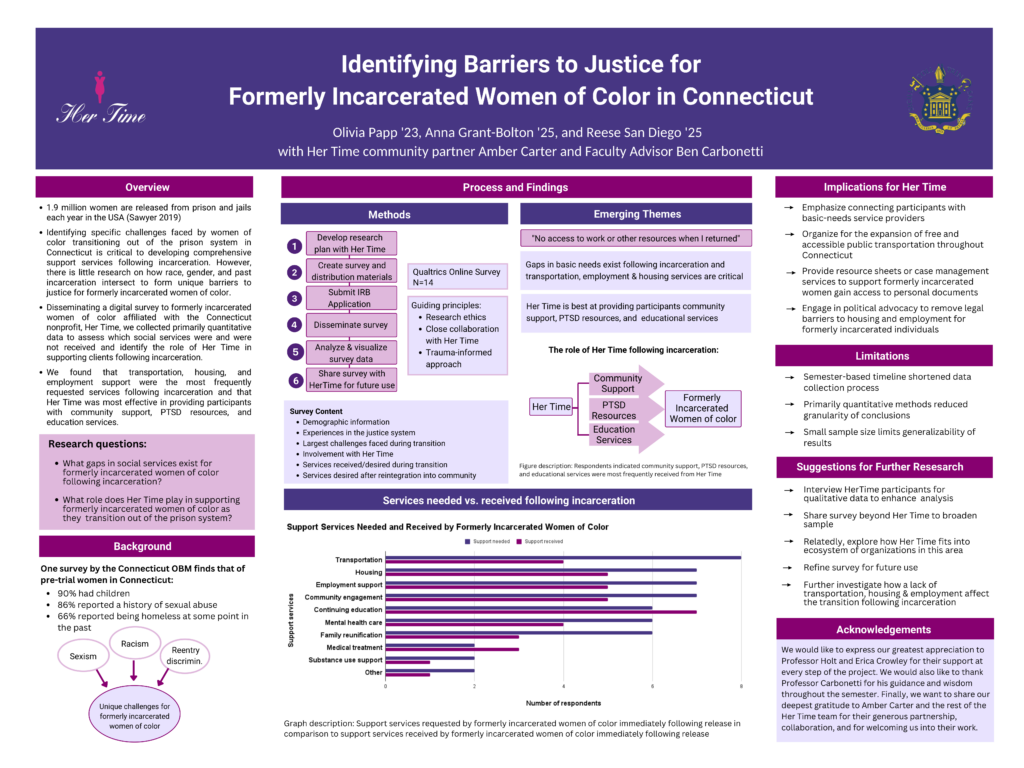
Mapping Correlates of Gun Violence in Hartford
Scott Alexander ’23, Joshua Jacob ’23 and faculty sponsor Sarah Raskin with community partner CT Against Gun Violence (CAGV)
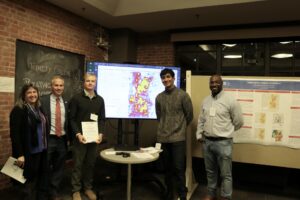
Abstract: Gun homicide in 2021 was at its highest level in 25 years, with 118 homicides in Connecticut. In order to find solutions with this public health crisis, we investigated where the shootings are happening in Hartford, particularly in relation to city and community services, vacant lots (place-based solutions), schools, parks and areas of blight. This project worked to gather, clean, analyze and map publicly available Police Crime Data (reported incidents of crime involving a firearm) and layer that with various neighborhood characteristics. Connecticut Against Gun Violence hopes to use the data and maps as a tool to help focus gun violence intervention and prevention strategies to the areas that are most needed.
Government Policies and Their Relation to Eviction
Kash Jain ’24 and faculty sponsor Hernán Flom with community partner Juan Fonseca Tapia, Center for Leadership & Justice
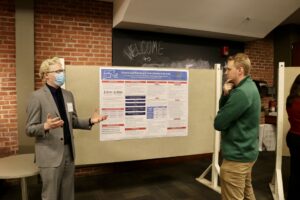
Abstract: Understanding what government policies reduce evictions is critical to reducing socioeconomic inequality and ensuring that people can stay in their homes. In Hartford, a city with an unusually high eviction rate, finding policy solutions is crucial. This research compared eviction and housing-focused government policies (at the state and local level) in Hartford with Worcester, MA, a similar city with a much lower eviction rate. Although eviction reform must primarily be targeted at the state level, cities can take some actions. Specifically, Hartford should reform its zoning regulations and expand venues for community input, while the state of Connecticut should expand its housing stock and rental assistance. The generalizability of this research is limited, as state and local policies vary drastically across the United States; however, this is useful in informing what can be done to reduce evictions in Hartford, and what policies organizations like CLJ can advocate for.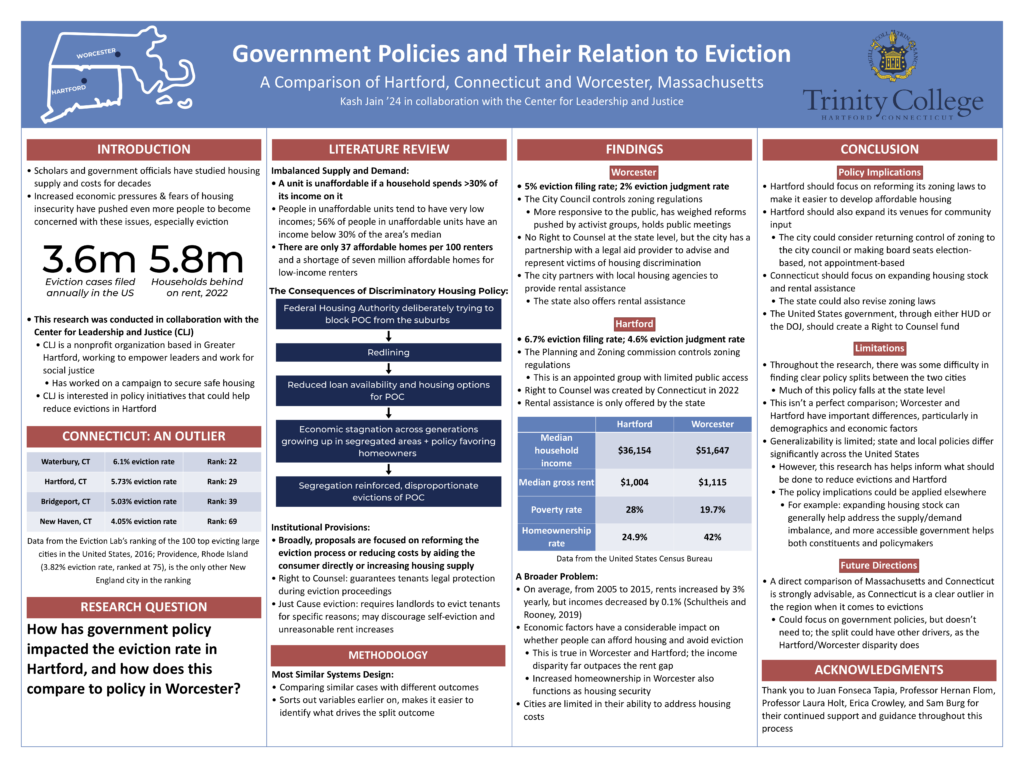
Graffiti History in Hartford: A Story of Criminalization and Culture
Adyanna Odom ’23 and faculty sponsor Seth Markle with community partner Jasmin Agosto ’10, Hartford History Center
Abstract: Perceptions of graffiti have changed in Hartford and the world within the last 50 years with the arrival of the Hip-Hop scene. Currently, there is little publicly available information on the development of the graffiti scene within Hartford, and that is what motivated me to add to the Hartford History Center’s Hip-Hop collection about graffiti. The current Hartford History Center Hip-Hop collection focuses on the peace train competitions from 1983-1984. The Hip-Hop collection largely exists online and can be accessed by going online to the CT Digital Archive and under collections selecting the Hartford Public. Through qualitative interviews with Dooney Bates, an archival scan of the existing Hartford Hip-Hop archive, and an archival scan of the Southside Media Newspaper from 1970-1987, this project explores two research questions 1) What is the insider vs. outsider perception of graffiti in Hartford in the 1970s/80s? and 2) Is there another narrative apart from the Peace Train dominant narrative of Hip-Hop in Hartford from the 1970s/80s?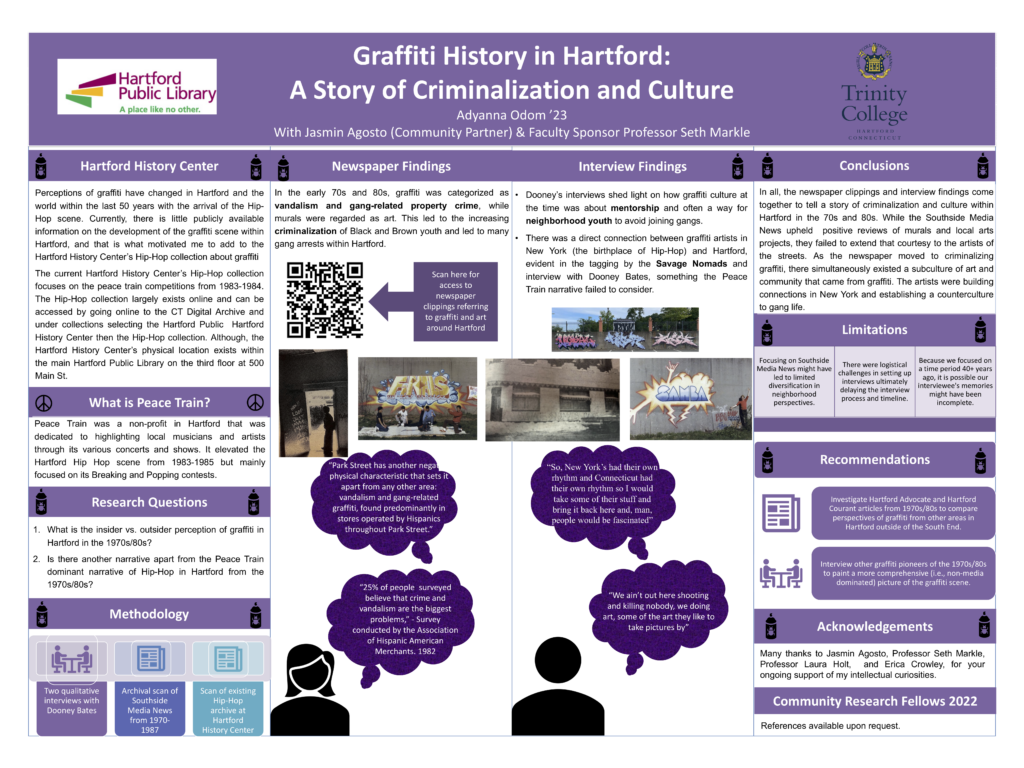
Latine Perceptions of Health & Healing in Hartford
Isabelle S. Sayas ’23 and faculty sponsor Janet Bauer with community partner Hispanic Health Council
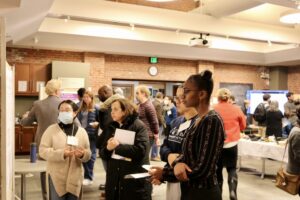
Abstract: The health of children is contingent upon the health of their caretakers, as well the adults’ ability to access preventative care and treatment for the entire family. This is a core belief of the HUSKY 4 Immigrants Coalition, which has spent the past three years fighting to expand healthcare access to Connecticut’s entire immigrant population, including those who are undocumented. Undocumented status often presents an immediate barrier to access, or a reason to not obtain treatment. This project explores the perceptions of health and healing among female Latine caretakers in mixed-citizenship households as they navigate the American healthcare system. There is an enormous gap in literature regarding the mental, emotional, and physical effects female caretakers internalize in attempting to ensure the health of their loved ones. Through an analysis of testimonials in support of HUSKY for all and unstructured interviews, I learned that the most salient themes in these women’s experiences are: fear of economic implications of sickness, seeing medical providers as a last resort, and identifications of survivor’s guilt among family members who do have health care coverage.
Holistic Resources for Undocumented Persons with Intersectional Identities
Tiana Sharpe ’23 and faculty sponsor Aidalí Aponte-Avilés and community partner Hartford Deportation Defense
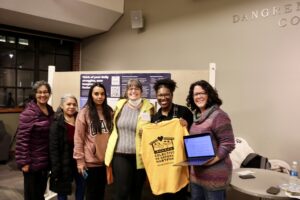
Abstract: According to the American Immigration Council, about 15% of Connecticut residents were born in another country, and 16% of residents are native United States citizens but have at least one parent born in another country. Twenty-three percent of that population, or 120,000, are Undocumented Individuals in Connecticut. Although direct statistics concerning the scope of Undocumented Persons in Hartford are difficult to establish, the colorful image of Park Street and Trinity courses like Hispanic Hartford establish that this city is an important place-making resource for Immigrants, particularly Latine Immigrants. While Connecticut is more progressive than other states, without federal legislative support, many Undocumented People are left out of systems that support their basic human rights. However Undocumented Folx experience a multitude of life crises and have to navigate those issues in light of their status and within other intersections of marginalization like queerness or disability. I sought to investigate how local organizations support Undocumented Folx in need, and highlight what subpopulations of people have limited support. I partnered with Hartford Deportation Defense to construct their website and create an online resource guide of organizations filtered by need-based identifiers. I did extensive outreach to document and analyze Hartford’s established aid networks. Hartford organizers have been thinking thoroughly about the visibility of Undocumented Communities but are limited in language accessibility and funding. The role of established immigrants in these networks is vital as accompaniment and translation services become available and there is more access to resources.
Caregivers’ Perceptions of the Imagination Library and Its Impact on Young Children
Emma Shorten ’25 and faculty sponsor Elise Castillo and community partner United Way
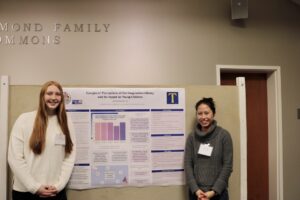
Abstract: Reading to children in their early developmental stages is absolutely crucial to learning how to identify words, finding new interests, exploring imagination, forging strong relationships, and far more. It is important for children all across the country/world to have access to books, but many households have limited or no books due to factors such as accessibility and/or financial constraints. Dolly Parton’s program, Imagination Library, is committed to creating a simple, free-of-charge way to mail books to millions of children across the world. Partnering with United Way, I was able to collect qualitative – and also quantitative – data about how enrolled families perceive the program by conducting five interviews with participating families all around Hartford. By asking a series of questions, I was able to find that all caregivers are especially favorable toward this program after seeing it directly impact their children’s development as learners and shape their character in extraordinary ways.
To learn more about the Community Learning Research Fellows Program, visit http://cher.trincoll.edu/fellows or contact Instructor [email protected] and Director of Community Learning [email protected].
Photo credits to Gabby Nelson and Emma Kozak ’25
